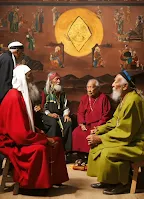From Unity to Division: How Race, Religion, Politics, and Wealth Shape Our World
We Start as Humans: How Race, Religion, Politics, and Wealth Divide Us
In a world that begins with a shared humanity, it is perplexing how the forces of race, religion, politics, and wealth manage to pull us apart. Despite the common threads that bind us as people, these powerful influences create divisions that shape our societies and define our identities. Understanding how these elements impact our interactions can help us bridge the gaps they create and move toward a more unified existence.
The Innocence of Our Beginnings: We Are All Human
From the moment we are born, we share a universal experience—our humanity. Regardless of where we come from or what our future holds, we all start as humans, with the same basic needs, emotions, and potential. This commonality should be a source of unity, yet as we grow, we find ourselves sorted into different categories by the world around us.
As children, we are often oblivious to the labels that society assigns. We play, learn, and grow with others without concern for race, religion, politics, or wealth. It is only as we age that these factors begin to influence how we see ourselves and others. The purity of our shared human experience is gradually overshadowed by the divisions imposed by society.
Race: The Invisible Lines That Pull Us Apart
Race, a construct that has no biological basis, has long been a source of division. While race itself is an artificial concept, the impact it has on society is profound. The color of our skin, the texture of our hair, and our physical features are often used to define who we are and where we belong. These superficial differences, however, mask the reality that we are all fundamentally the same.
The idea of race has been used throughout history to justify inequality, discrimination, and even violence. It creates invisible lines between people, pulling us apart and reinforcing the notion that some are inherently different or superior to others. These divisions can lead to deep-seated prejudices that perpetuate cycles of mistrust and misunderstanding, further fracturing the human experience.
Religion: A Source of Faith, Yet a Divider of People
Religion, at its core, is meant to be a source of comfort, guidance, and community. It provides answers to life's big questions and offers a sense of purpose. However, religion can also be a powerful force of division, separating people into distinct groups based on their beliefs and practices.
Throughout history, religious differences have led to conflict, persecution, and even war. While many religions preach love, tolerance, and peace, the reality is that religious differences often create an "us versus them" mentality. This can lead to intolerance, exclusion, and even violence against those who do not share the same faith. Instead of uniting people under a common moral framework, religion can sometimes become a tool for separation, dividing people into factions that are often in opposition to one another.
Politics: The Art of Division
Politics is another major force that divides us. While politics is supposed to be about governance and the collective well-being of society, it often devolves into a battleground for competing ideologies. The political landscape is marked by stark divisions between left and right, liberal and conservative, progressives and traditionalists. These divisions are not just ideological; they can shape the very fabric of society, determining who has power and who does not.
Political divisions often manifest in bitter partisanship, where the goal becomes defeating the other side rather than working together for the common good. This zero-sum approach to politics can create deep rifts within societies, leading to polarization and a lack of compromise. Instead of fostering unity, politics often deepens existing divides, making it harder to find common ground and work towards shared goals.
Wealth: The Final Barrier That Segregates Us
Wealth, or the lack thereof, is perhaps the most tangible divider in society. Money has the power to create vast inequalities, determining access to education, healthcare, housing, and even justice. The gap between the rich and the poor is a persistent issue that leads to social stratification, where people are categorized based on their economic status.
Wealth can create distinct social classes, each with its own opportunities, privileges, and challenges. The wealthy often have access to resources and opportunities that the poor can only dream of, leading to a cycle of poverty that is difficult to break. This economic divide not only separates people physically through different neighborhoods, schools, and social circles but also emotionally and psychologically, fostering resentment, envy, and a sense of injustice.
The pursuit of wealth can also drive people apart, as the desire for material success can lead to competition rather than collaboration. In a world where money often equates to power, the wealthy may find themselves insulated from the struggles of others, further deepening the divide between different social classes.
Bridging the Divides: Toward a More Unified Humanity
While race, religion, politics, and wealth are powerful forces that pull us apart, they do not have to define our relationships with one another. It is possible to acknowledge these differences while still recognizing our shared humanity. By focusing on what unites us rather than what divides us, we can begin to bridge the gaps that these forces create.
Education, empathy, and open dialogue are key to overcoming the divisions that race, religion, politics, and wealth impose. By educating ourselves and others about the artificial nature of these divides, we can start to break down the barriers that separate us. Empathy allows us to understand the experiences of others, even when they are different from our own. Open dialogue provides a space for discussing our differences in a constructive way, helping to foster mutual understanding and respect.
Ultimately, the key to overcoming these divisions lies in our ability to see beyond the labels and categories that society imposes. By recognizing the humanity in everyone, regardless of race, religion, politics, or wealth, we can begin to build a more inclusive and unified world. It is a challenging task, but one that is essential for the future of our global community.
Conclusion: The Journey Back to Unity
In a world where race, religion, politics, and wealth pull us apart, it is more important than ever to remember our shared humanity. We may start as humans, but the forces that divide us do not have to define us. By working together to bridge these divides, we can create a society that values unity over division, compassion over competition, and understanding over prejudice.
As we navigate the complexities of a diverse world, let us strive to see the person behind the label, to find common ground, and to build connections that transcend the forces that seek to divide us. In doing so, we can return to the innocence of our beginnings and create a future where our shared humanity is the foundation upon which we build a better world.
Thanks for reading,
Have a nice day. 😊









Comments
Post a Comment